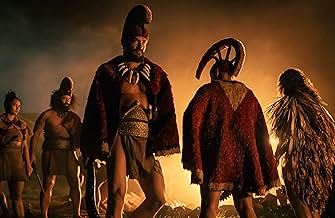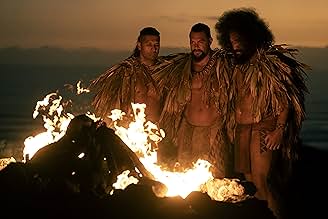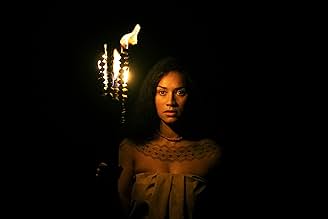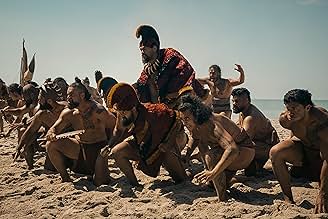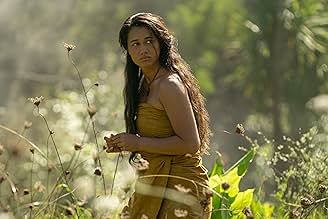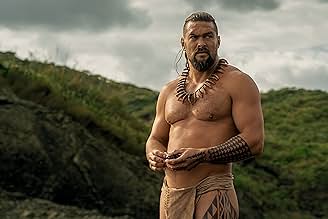A thrilling, unprecedented telling of the unification of the Hawaiian Islands from an indigenous perspective. A Hawaiian war chief joins a bloody campaign to unite the warring islands in ord... Read allA thrilling, unprecedented telling of the unification of the Hawaiian Islands from an indigenous perspective. A Hawaiian war chief joins a bloody campaign to unite the warring islands in order to save them from the threat of colonization.A thrilling, unprecedented telling of the unification of the Hawaiian Islands from an indigenous perspective. A Hawaiian war chief joins a bloody campaign to unite the warring islands in order to save them from the threat of colonization.
Browse episodes
Featured reviews
One episode in and it's very good. I'm just here to read the reviews from people complaining about subtitles. Their native language isnt English so don't expect them to speak it. If you can't read, just say so. It's got action, some drama, and the back stories are slowly filling in. It's a promising miniseries.
I am deaf and I was born and raised in Hawai'i, but with no Hawaiian ancestry. I still have my highest respect in Hawaiian values and culture. When I heard about this TV series by Jason Momoa, I was thrilled to watch. But once I started watching, I was looking around to turn on the subtitles because I am deaf. To my astonishment, I discovered the Hawaiian subtitles!! Luckily, I took the elementary Hawaiian classes at Kapi'olani CC, and to satisfy my curiosity, I turned on the subtitles in Hawaiian and... it gave me goosebumps!! By seeing the subtitles in true Hawaiian language, I was able to read and understood some of them. Incredible!!! I'm excited to be able to watch this with subtitle options being shown in English and Hawaiian. Mahalo, Jason Momoa and the entire crew behind this TV series and Apple TV for this amazing feat!
I'm stuck on this show, 3 episodes in and I'm sold on this. Jason kills this one again. My only issue so far is how fast he learnt English but I also like the fact that there is no time for BS, they really mean business. If you liked vikings and the likes you will certainly love this, it's fast paced and filled with reasonable action and also has a very good story.
Ignore the half wits that don't do subtitles, it's their loss. As a historical drama it works really well and pays plenty of respect to the indigenous people of the Hawaii's, the language only serves to add the feel of authenticity.
The story is a little clunky at times but it keeps you engaged and the the look of it is luscious. I for one enjoyed it.
The story is a little clunky at times but it keeps you engaged and the the look of it is luscious. I for one enjoyed it.
Even with all the footage of nearly naked men charging through jungles and across beaches to engage in grisly dances of bone breaking and neck slitting with weapons made from shark teeth, Apple TV's "Chief of War" is a work of impressive filmmaking and awesome storytelling.
The visuals of the $350-million production capture the majesty and pay proper respect to Hawaii's landscapes and seascapes (even if much of the filming took place in New Zealand). As of the end of the second episode, most of the characters were still speaking Hawaiian, subtitled on screen. It was one of the many demands for authenticity made by producer and star Jason Momoa.
Whether or not Momoa deserves all the credit, the production is steeped in realism, integrity and soulful understanding of the culture it depicts. Although Captain Cook had arrived and met his fate before the story begins, the islands were still separate kingdoms in the late 1700s, each with its own royalty and ruler. Relations between them were uneasy, never more than one step away from war.
The lush, tropical geography of paradise provides the backdrop for cutthroat warfare. Every Maui resident has heard the tales of when the waters of Iao Stream ran red with blood.
It would fall to the king who proved himself most mighty - ultimately Kamehameha I - to finally unify the chain of islands into a kingdom. The nine-part series leads up to that fateful unification.
The name of Momoa's character, Ka'aina, is not as familiar as others in these early chapters of written island history. But as a revered war chief, Ka'aina would play a key role navigating the treacherous shifting sands of tribal alliances and conflicts. Other names though, namely Ka'ahumanu (scene-stealing Luciane Buchanan), bring the chicken skin of instant recognition to those even slightly familiar with island history.
Moku, played by Maui's Moses Goods, appears in eight of the nine episodes. Maui's film industry veteran Branscome Richmond shows up as King Kalaniopu'u in Episode 3. The cast is almost all indigenous, some making their first appearances on screen.
Having the characters speak Hawaiian is a gutsy call for the folks at Apple. But there are rewards. The cadences of the language are lilting and haunting, accompanying the subtitles. The writers, including Momoa, have a lot of dots to connect for audiences unfamiliar with the history of the realm that would come to be named Hawaii. They have to depend on the characters' dialogue to provide the historic and cultural context of the action. The fact that this feat of storytelling feels like poetry - and echoes with the power and myth of the culture's oral tradition including the creation chant, the Kumukipo- is all the more remarkable.
The visuals are poetry, too. Hawaii's landscapes are filmed in a way showing that humans' place in them is a tiny speck in the natural grandeur. This version of Hawaii feels organic - a way of life in harmony with the land and the sea - rather than a depiction of "natives," seen through a lens by a culture from elsewhere.
The fascinating faces of the characters, some adorned with tattoos, are shot in close-up, providing them with the proper gravitas and honor. Prophesy and myth are given weight equal to other plot elements - as when the milky-eyed spirit Taula (Roimata Fox) appears in visions foretelling future events.
"Chief of War's" vicious violence is almost unbearable to watch at times, but its results were no more lethal than all the blood baths and genocides carried out by more supposedly "civilized" societies through the centuries.
The first Polynesian voyagers to arrive on Hawaii's shores arrived a millennium before Captain Cook "discovered" the islands. The voyages navigated by the stars in open canoes across thousands of miles of open ocean a thousand years before the Europeans realized that the Earth wasn't flat.
Still, the more deeply the show dives into the unique history and culture of these particular Pacific Islands, the more it discovers what it means to be human, anywhere on the planet.
"Chief of War's" roots are ancient, translated into cutting-edge film technology, Rather than mere narrative, it is an origin story both natural and supernatural, searching for the truths of the people and culture of a place often mistaken for paradise.
The visuals of the $350-million production capture the majesty and pay proper respect to Hawaii's landscapes and seascapes (even if much of the filming took place in New Zealand). As of the end of the second episode, most of the characters were still speaking Hawaiian, subtitled on screen. It was one of the many demands for authenticity made by producer and star Jason Momoa.
Whether or not Momoa deserves all the credit, the production is steeped in realism, integrity and soulful understanding of the culture it depicts. Although Captain Cook had arrived and met his fate before the story begins, the islands were still separate kingdoms in the late 1700s, each with its own royalty and ruler. Relations between them were uneasy, never more than one step away from war.
The lush, tropical geography of paradise provides the backdrop for cutthroat warfare. Every Maui resident has heard the tales of when the waters of Iao Stream ran red with blood.
It would fall to the king who proved himself most mighty - ultimately Kamehameha I - to finally unify the chain of islands into a kingdom. The nine-part series leads up to that fateful unification.
The name of Momoa's character, Ka'aina, is not as familiar as others in these early chapters of written island history. But as a revered war chief, Ka'aina would play a key role navigating the treacherous shifting sands of tribal alliances and conflicts. Other names though, namely Ka'ahumanu (scene-stealing Luciane Buchanan), bring the chicken skin of instant recognition to those even slightly familiar with island history.
Moku, played by Maui's Moses Goods, appears in eight of the nine episodes. Maui's film industry veteran Branscome Richmond shows up as King Kalaniopu'u in Episode 3. The cast is almost all indigenous, some making their first appearances on screen.
Having the characters speak Hawaiian is a gutsy call for the folks at Apple. But there are rewards. The cadences of the language are lilting and haunting, accompanying the subtitles. The writers, including Momoa, have a lot of dots to connect for audiences unfamiliar with the history of the realm that would come to be named Hawaii. They have to depend on the characters' dialogue to provide the historic and cultural context of the action. The fact that this feat of storytelling feels like poetry - and echoes with the power and myth of the culture's oral tradition including the creation chant, the Kumukipo- is all the more remarkable.
The visuals are poetry, too. Hawaii's landscapes are filmed in a way showing that humans' place in them is a tiny speck in the natural grandeur. This version of Hawaii feels organic - a way of life in harmony with the land and the sea - rather than a depiction of "natives," seen through a lens by a culture from elsewhere.
The fascinating faces of the characters, some adorned with tattoos, are shot in close-up, providing them with the proper gravitas and honor. Prophesy and myth are given weight equal to other plot elements - as when the milky-eyed spirit Taula (Roimata Fox) appears in visions foretelling future events.
"Chief of War's" vicious violence is almost unbearable to watch at times, but its results were no more lethal than all the blood baths and genocides carried out by more supposedly "civilized" societies through the centuries.
The first Polynesian voyagers to arrive on Hawaii's shores arrived a millennium before Captain Cook "discovered" the islands. The voyages navigated by the stars in open canoes across thousands of miles of open ocean a thousand years before the Europeans realized that the Earth wasn't flat.
Still, the more deeply the show dives into the unique history and culture of these particular Pacific Islands, the more it discovers what it means to be human, anywhere on the planet.
"Chief of War's" roots are ancient, translated into cutting-edge film technology, Rather than mere narrative, it is an origin story both natural and supernatural, searching for the truths of the people and culture of a place often mistaken for paradise.
Did you know
- TriviaJason Momoa and Temuera Morrison play Hawaiian chieftains Ka'iana and Kahekili. They were previously son and father in the "Aquaman" film duology.
- ConnectionsReferenced in The Nite-Cap: Has The Superhero Hype Come To An End? (2025)
August 2025 TV and Streaming Premiere Dates
August 2025 TV and Streaming Premiere Dates
Night Always Comes and "Outlander: Blood of My Blood" are two of this month's most anticipated TV releases. Check out our August calendar for more!
- How many episodes does Chief of War have?Powered by Alexa
Details
- Runtime
- 50m
- Color
- Sound mix
- Aspect ratio
- 2.39:1
Contribute to this page
Suggest an edit or add missing content







